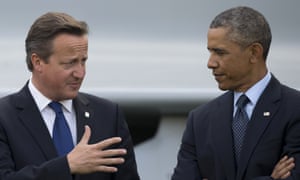
The White House has attempted to head off a potential rift in the Anglo-American relationship, insisting that Barack Obama did not mean to be critical of David Cameron in his recently published remarks about Libya.
The president suggested in an interview with the Atlantic magazine that the current political chaos in Libya was caused in part because the British prime minister was too “distracted” to oversee a smooth transformation to a new stable regime.
The interview, in which Obama justified his non-interventionist foreign policy,caused anger in the UK, with one of the cabinet ministers most closely involved with Libyan planning saying the US president’s remarks “had been extremely unfair and completely untrue”.
Andrew Mitchell was international development secretary at the time and said Obama could not have been aware of the strenuous efforts made to learn the lessons of Iraq, and to undertake post-conflict planning. The planning, he said, came to nothing due to the political chaos inside Libya. Josh Earnest, the White House spokesman, told reporters on Air Force One that the US “values deeply the special relationship” with the UK and shared the responsibility for dealing with the situation in Libya, which is threatened by Islamic State militants following the overthrow of Muammar Gaddafi.
His assurance followed a statement by Ned Price, spokesperson for the White House National Security Council, who said: “Prime Minister Cameron has been as close a partner as the president has had, and we deeply value the UK’s contributions on our shared national security and foreign policy objectives which reflect our special and essential relationship.
“With respect to Libya, the president has long said that all of us – including the United States – could have done more in the aftermath of the Libyan intervention. More broadly, the UK has stepped up on a range of issues, including PM Cameron’s leadership within Nato in terms of meeting the 2% commitment and pressing the other members of the alliance to do so at the Wales summit.”
The row came as sustained pressure is placed on Libyan politicians to form a national unity government that would pave the way for airstrikes against Isis forces in Libya.
It has been suggested agreement on a new government proposed by the prime minister designate, Fayez Sarraj, could come in the next few days after months of arguments and delay.
The Obama administration has suggested twice in a month that Cameron was distracted in the wake of the Libyan invasion. The exact same criticism was madein a New York Times profile of Hillary Clinton’s role in Libya, but the Atlantic interview was the first time Obama had openly criticised his French and British counterparts. The interview also implied criticism of the US State Department for misunderstanding the tribal complexities inside Libya
Obama said Cameron had been “distracted by a range of other things” following the air campaign. He added, “When I go back and I ask myself what went wrong, there’s room for criticism, because I had more faith in the Europeans, given Libya’s proximity, being invested in the follow-up.”
No comments:
Post a Comment